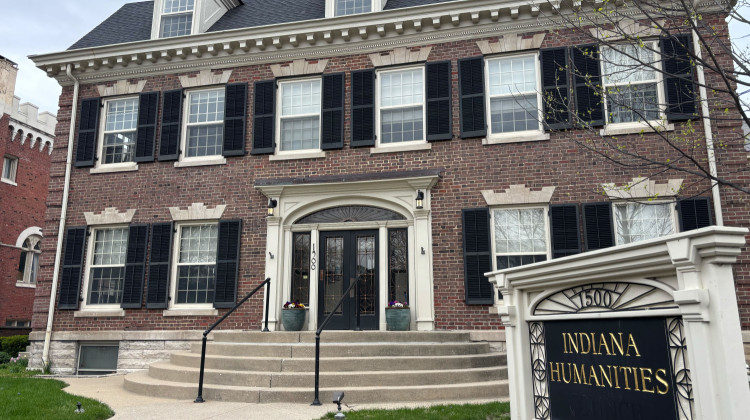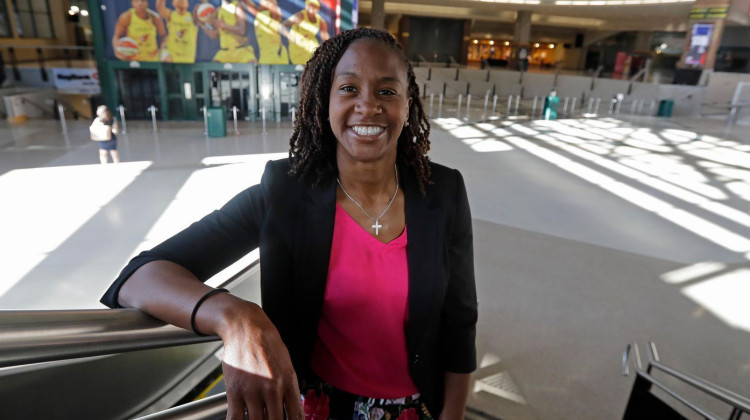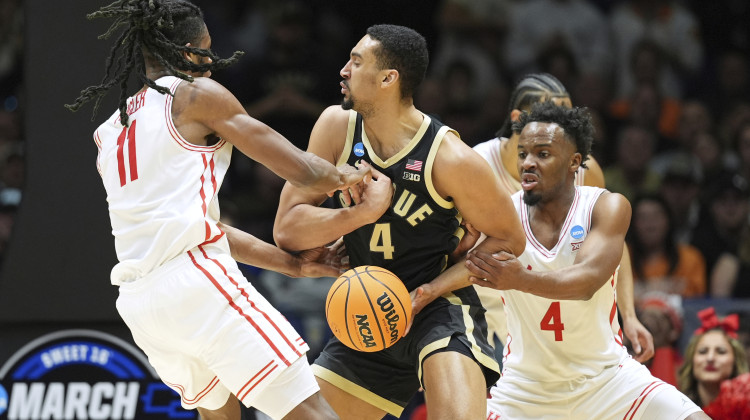Longtime local arts reporter and WFYI journalist Jill Ditmire, whose work in local broadcast journalism included "Curious Mix," "Indiana Outdoors" and "The Good Life," died last weekend. She was 56.
Jill has been part of the lives of Midwest viewers and listeners for 25 years. She held many different roles throughout her career, including anchor of WFYI's "All Things Considered," reporter at almost every Indianapolis television station, producer and co-host of a range of Indiana public media programs, frequent freelance contributor to print publications, and a reporter and anchor at several radio stations. She brought both depth of knowledge and innovation to her work, assets that led to a series of social media videos that many WFYI audience members used to stay connected to and inspired by the arts, especially during COVID-19.
Jill's career extended beyond broadcast media, led largely by her interest in food and wine. She served as a judge and as a contestant in a range of wine and food events, and the owner and buyer for the Mass Ave. Wine Shoppe and Café. She was also active with local arts group IDADA and IndyFringe as a volunteer and leader and served as an event emcee for many local nonprofit organizations
We will miss her dearly at WFYI, and we are not alone. To celebrate her work and investment in our community, Arts Council of Indianapolis Vice President of Artist Services and Engagement Shannon Linker, WFYI Vice President of Production Clayton Taylor, and WFYI Reporter Taylor Bennett met virtually to remember our friend and colleague.
To listen to the audio of the broadcast version of that interview click the player above. The full transcript of the conversation is below.
Transcript:
TAYLOR BENNETT: The station lost one of our own, Jill Ditmire. She passed away over the weekend. I know personally, I was deeply shocked and just very sad by the news. Her face and her voice are just part of the lives of so many viewers and many listeners, for so many years, and she held so many different roles.
I always admired her for her very vast broadcast experience, and she’s always been so kind. I know Clayton that you worked with her on a number of things over the years, what are some of your fondest memories of Jill?
CLAYTON TAYLOR: I came to WFYI in 2001, one of the first people I worked with, I think, was Jill. And at that point, she was definitely somebody who, you know, she had left WTHR at that point. And she had started a production of a series called “The Good Life,” which is about wine and good food in Indiana. And she really was an early pioneer of what became like the craft brewing movements and in just the Indiana wine industry. And so you know, at that point, I just knew that Jill was somebody who was not only passionate about her work, but took joy in her work. And so you know, that being, you know what, that has been close to a 20-year, professional friendship. And it was just great for me. And we've been able to work on so many things over the years. And I'm still in shock.
BENNETT: Jill worked on a lot of different things. But I think one of her passions -- she was a tireless advocate for the Indianapolis arts community. That was her thing. She had a deep passion for the local arts community. She truly cared. She showed every single time that she covered any show, event, or just showcasing any artists. Shannon, you were there. You know how she was when she covered this beat. What are you thinking right now?
SHANNON LINKER: Well, I think myself and all of the arts community, we're just still in disbelief. And we're shocked. We just saw Jill as someone so full of life and energy and tireless. Her zest for life was really incredible. Just the ability for her to be all over town on a first Friday, hit every place, and still have the same energy and enthusiasm for the last spot as she did for the first was was always just inspiring to us.
The things that I remember and I think about … I have been thinking about all night, last night, was what I remember as just that genuine passion. Like you said it was personal to her, it was something that she loved and valued. And that really came through all of her interviews and all of her work. So she really wasn't just covering a story, you could tell that, that she loved the arts. And she was an audience member too. She would go out of her way to actually see and understand the artwork and meet the artist. And that was something that I really valued. Because every time she would come and interview an artist, or me, for an event we were having -- often when a reporter would come I would need to introduce them to the artist and introduce the project and share a little bit about the Arts Council and who we were -- but with Jill, I never did. She always knew the artists. She knew what they were working on. She knew their history. She knew their last show and what they were in. It was just incredible.
She was, like one of us interviewing our own group, you know? She was definitely an insider in that, and I think that's why you're seeing so many, so much outpouring of love on social media right now from artists -- because she was one of them. They felt that she understood them and appreciated them and valued them -- for what they really do and bring to the community.
BENNETT: I know, during our news assignment meetings -- and we talked about what we were working on -- and she would just name off so many different things that she was working on in the arts community, and I was always so impressed with her. She was always very professional and very detailed. And again, I go back to passion. She had a deep passion for everyone in the arts community. What is your favorite memory? I know there's probably so many, but what’s one that really stands out to you?
LINKER: Oh, wow. Yeah, there are so many. Just every time she comes into a room, into a crowded gallery. She lights up the room, you know, everybody knew her. She knew everyone. Everyone was happy to see her. That is, that's a memory that happened 100 times, at 100 different events.
But I think what will stick with me is, during the pandemic, when everyone was afraid, everyone in the arts community -- we needed people to see the work and experience the work and be in the room. And we realized we weren't going to be able to do that. And so Jill was really the first one to figure out a way that we can have a personal interaction with artists and artwork during the shutdown. So she was out and about going to galleries and doing social distance interviews with an artist or a curator. And taking everyone along with her.
And so she did that with us for one of our shows, and I just have this memory of her standing there with her mask talking, you know, six feet away from an artist and I just thought, “Wow, she is the reason people are going to be able to stay connected to this work and know what we're doing and know that it's still there. And it's still happening. And it's still important.”
BENNETT: Her absence around the station will be felt, and we all, deeply, will miss her.
TAYLOR: Jill is somebody who truly loved her work. And she took joy in it, and she had that capacity of always being in the moment with the people she was with and making them feel completely at ease -- and that they were the most important person, and brilliant, and she was talking to them. Yeah, she was a person who just knew so many people.
But also I think she just never really clocked off the job -- because I think, you know, the job was such a passion for her that she didn't measure it in terms of time or or work time. She was just going to be there. And, you know, what my recollections was -- right after some of the unrest downtown and some artists were working on the boarded up storefronts. I had several artists just come up spontaneously when they found out I was with WFYI to say how much they appreciated the attention and love that was being shown to them by Jill.
BENNETT: I want to thank you both for taking the time to share your memories of Jill.
CLAYTON: Absolutely.
LINKER: Thank you so much for allowing us the time. She will absolutely be missed.
 DONATE
DONATE






 View More Articles
View More Articles

 Support WFYI. We can't do it without you.
Support WFYI. We can't do it without you.